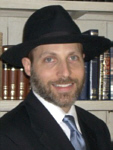

The Ten Commandments, Killing, and Murder:
A Detailed Commentary
by Rabbi Dovid Bendory, Rabbinic Director,
Jews for the Preservation of Firearms Ownership.
Copyright 2012 JPFO
![]()
This is a detailed commentary, intended to give valuable reference to Jews and Christians who find themselves facing unfounded pacifist dogma.
 It is an event that forever changed the course of all human history: the Sinai Revelation. (Exodus 18:1-20:23). Soon after their liberation from Egyptian slavery, the Jewish People encamp at Mt. Sinai where G-d speaks to the entire nation and gives the Ten Commandments.
It is an event that forever changed the course of all human history: the Sinai Revelation. (Exodus 18:1-20:23). Soon after their liberation from Egyptian slavery, the Jewish People encamp at Mt. Sinai where G-d speaks to the entire nation and gives the Ten Commandments.
But one of those ten is among the most commonly mis-translated verses of all of Hebrew Scripture -- and its mis-translation has resulted in deadly mis-interpretation.
Says the Torah (Exodus 20:13): Lo tirtzach!The Hebrew word used has a clear and unequivocal meaning: “Do not murder.”
Unfortunately, this verse is generally mistranslated as “Do not kill.” But the Hebrew could not be more clear, and there is a world of difference between killing and murder.
This is the Sixth Commandment. How many times have you heard “Thou shalt not kill”? This mistranslation is etched upon the hearts and minds of both Jewish and Christian children and adults with pernicious results. Can we possibly estimate the numbers of lives that have been lost by foolish pacifism rather than righteous defense in the face of evil?
Here’s a bit of detail on the “mechanics” of this translation error. If you are ever challenged regarding your corrected understanding, JPFO, once again, gives you the “intellectual ammunition” to hold your ground.
![]()
We begin by exploring the English vocabulary and variations on “killing” and “murder”, and we will then explore the nuances of the parallel Hebrew words in order to understand the Biblical text.
In English, there are different ways of stating that “Ploni killed Almoni” depending on the culpability and guilt involved. (The names “Ploni” and “Almoni” are traditionally used in rabbinic commentaries as the Jewish equivalent of “John Doe.” See Ruth 4:1.) Consider the different possible ways of describing the killing:
• First-degree, or pre-meditated murder.
• Second-degree murder; an intentional murder in the spur-of-the-moment, albeit not pre-meditated or planned.
• Voluntary homicide, a form of manslaughter.
• Involuntary homicide, a less culpable form of manslaughter, such as if a driver accidentally hit a jay-walking pedestrian.
Note that “killing” itself need not have a moral context -- a soldier kills in battle, an intended murder victim kills in self-defense, a drug dealer kills his competition, a doctor kills a patient. Whether “killing” caries criminal culpability (the drug dealer), civil culpability (the doctor), or is righteous (the intended murder victim) depends on the context and circumstances.
![]()
To understand the Biblical words for “killing” requires first understanding a grammatical point. Hebrew words all contain three-letter roots that provide the core meaning of a word; these three consonants are then vocalized by adding in vowels and attaching prefixes, suffixes, or infixes.

David did not murder Goliath
One such Hebrew root is R-Tz-Ch; it appears in twenty one passages in the Hebrew Scripture. Two of these are in the Ten Commandments (here in Exodus 20:13 and again in Deuteronomy 5) where no context is given. We are twice told that R-Tz-Ch is something we are not to do, but without any context, it is impossible to discern the precise meaning of the term.
However, the root R-Tz-Ch appears multiple times in reference to Cities of Refuge to which an “accidental murderer” can flee. (Numbers 35; Deuteronomy 5, 19; Joshua 20, 21) In each of these passages, the “accidental murderer” has definitely killed someone; the question concerns whether the person killed out of innocence or out of negligence. To use the English terms described above, there has been an involuntary homicide, but whether or not the perpetrator caries culpability or is punishable has not been determined. Such a person is called in Hebrew an “accidental murderer” until s/he stands trial -- and the text explicitly uses the word “accidental” (or “negligent”) in conjunction with the root R-Tz-Ch to make this clear. The requirement to clarify that this R-Tz-Ch was accidental demonstrates that without this clarification, R-Tz-Ch is by definition either willful or negligent.
Indeed, we find that by far the most common use of R-Tz-Ch is to describe a murderer who kills pre-meditated or with malice. (Deuteronomy 22; Judges 20; 1 Kings 21; 2 Kings 6; Isaiah 1; Jeremiah 7; Ezekiel 21; Hoshea 4, 6; Psalms 42, 62, 94; Proverbs 22; Job 24) When used in this way, the root R-Tz-Ch need not be modified with an adjective or adverb to clarify willful intent; the principle meaning of the word R-Tz-Ch is murder of at least the second degree, possibly first degree. The word implies criminal culpability and guilt, and thus the Sixth Commandment is clearly rendered into English as “do not MURDER.”
![]()
As in English -- where we have “murder”, “kill”, “homicide”, and other words -- Hebrew provides other roots to describe “killing.” The other Hebrew words used in connection with taking human life are M-O-T and H-R-G. However, these words were not chosen for the Decalogue. Let’s explore their meanings and how they differ from R-Tz-Ch.
H-R-G is in fact used to describe the first murder in history, Cain’s killing of Abel (Genesis 4:8). As that story makes clear, Cain is responsible for Abel’s death -- but was it willful and intentional?

Did Cain merely kill Abel?
Indeed, the word H-R-G is also used to describe the taking of life, whether willful or accidental, in a non-criminal context. It is used by Cain (Genesis 4:14) in his lament, “May whoever finds me take my life.” While H-R-G perhaps describes a willful killing in this usage, it is hardly criminal. For other examples of H-R-G meaning “murder”, see Genesis 20, 27, 37; and especially Exodus 21:14. H-R-G can also refer to righteous killing, such as in self-defense or defense of the innocent; see Exodus 2:14, 4:23, 15:15. But note in these various usages that H-R-G, when it refers to murder, is modified with a word like “intentional” to make it clear that it means “murder” as opposed to “killing.” (e.g., Exodus 21:14) (There are tens of other uses of this word, too numerous to survey in this brief essay.)
Thus, were the Ten Commandments to command us “Don’t H-R-G”, the meaning would be ambivalent -- it could mean murder or killing and would require further descriptive terms like “willful” or “accidental” to make the meaning clear.
The third Hebrew word for death is M-O-T. This word appears in two forms: as an intransitive verb and as a causative verb. In the intransitive, it means “to die” (Genesis 3:3-4); in the causative, it means “to kill” (Genesis 18:25). In the causative form, it is modified (like H-R-G) to indicate whether the killing is a murder (Genesis 37:18) or an appropriate and righteous punishment (Genesis 18:25). In fact, we are told that the murderer (RoTzeaCh) is to be killed (MOT yuMaT) in punishment. (Numbers 35:16-18) The taking of life as a punishment for a capital offense is clearly a morally positive act. Killing is thus obviously permissible -- making it impossible to render the Sixth Commandment as “do not kill.”
![]()
The Torah chooses its language very carefully, and indeed, every dot and tittle is parsed to understand the full meaning. G-d chose the root R-Tz-Ch for the Ten Commandments to make it clear and explicit: murder is an evil, heinous crime, a crime that -- like the others in the Ten Commandments -- is destructive of civilization itself. But killing, while a grave action that must be seriously evaluated, is at times a necessary action -- one that is a sanctioned last recourse under prescribed circumstances and one that is occasionally morally appropriate as in the taking of life as penalty for a capital offense.
In fact, killing -- righteous, justified killing -- is the Torah’s Divine punishment for the convicted murderer. This is clear from Numbers 35:16-18 (cited above) as well as Genesis 9:6: “If the blood of one man is spilled by another, his blood shall be spilled.” (In context, this is a clear reference to murder, not merely physical harm.)
Thus while murder -- killing with criminal intent and malice -- is clearly prohibited at all times and in all circumstances, killing itself is not. In a previous commentary, we saw that Moses killed an Egyptian taskmaster who was beating an innocent Hebrew slave. In Hebrew scripture G-d Himself kills in punishment many times -- Noah’s generation, the people of Sodom, and the Egyptian firstborn are a few examples. The courts are commanded to take the life of the convicted murderer as punishment. We are even told that killing to prevent a rape is permissible (Deuteronomy 22:26 as understood in Yoma 82a, Sanhedrin 74a, Pesachim 24b).
While it may be true that Torah and Hebrew Scripture is a vast enough corpus that one can find or read in at least perfunctory support for any idea, there is no question that a proper understanding of Torah Law does not advocate pacifism but rather righteous defense of the innocent. May we never need to rely on such law.
“THOU SHALT NOT MURDER.” the Sixth Commandment
Shalom,

Rabbi Dovid Bendory
Rabbinic Director
Jews for the Preservation of Firearms Ownership
(http://jpfo.org)
![]()
Rabbi Bendory is an NRA Certified Firearms Instructor.
The Rabbi's Archive page.
© Copyright Jews for the Preservation of Firearms Ownership 2012.
![]()




































